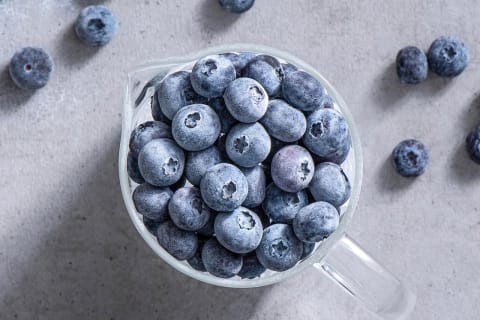The one ingredient in this drool-worthy dish that really steals the show is our favorite summertime staple—the blueberry. Blueberries make an easy, tasty, and nutritious addition to your favorite meals and recipes. In a 1-cup serving, you get crave-worthy flavor and beneficial vitamins and minerals, including four essential nutrients and phytonutrients. Additionally, there’s a growing body of evidence1 examining how blueberries can be a part of eating patterns that support brain health, especially as part of an overall healthy lifestyle. mindbodygreen: Can you tell us a bit more about the new research looking at the relationship between blueberries and brain health? Joey Thurman: A new research study2 published in April in Nutrients found that blueberries have cognitive benefits. The researchers found that the equivalent of a half-cup of fresh blueberries per day, consumed as freeze-dried blueberry powder, may contribute to protection against cognitive decline when implemented early in at-risk individuals. This is an important finding given that in the United States, nearly six million older adults live with dementia. Since limited treatments for cognitive decline exist, preventive approaches and mitigation of risk through proper nutrition are of increasing importance. Given that neurodegenerative changes associated with cognitive decline start in midlife, this research indicates that blueberries may present an opportunity for early intervention, by targeting modifiable risks like poor nutrition and related metabolic disturbance. mbg: How do blueberries work to support brain health? JT: There are many nutrients that can help support brain health—one that is found in fruits and vegetables is anthocyanins. Compared to other popular fruits, berries are uniquely high in anthocyanins, plant compounds that are responsible for their vibrant blue, red, and purple color. Research shows that the anthocyanins found in blueberries (163mg/100g) may help to improve mild cognitive performance in older adults. JT: I enjoy 3 to 5 pounds of blueberries a week (yes, you read that right), but don’t fret—you don’t need to eat this much; just a handful will do. Aim for 1 cup per day—either fresh or frozen—and grab a boost of blue to liven up any meal or snack. Blueberries taste equally delicious in salads, snacks, entrees, cocktails, or straight from the package (my personal favorite way to enjoy them). mbg: Is there one way of eating blueberries that’s more effective than others? JT: Some people think fresh blueberries are more nutritious than frozen, but that is far from the truth. Frozen blueberries are a convenient and cost-effective way to help you eat nutritiously. They are frozen at the peak of freshness, locking in their healthy goodness, so you don’t have to worry about the nutrition diminishing. There is no one way to eat blueberries that’s more nutritious than another, but pairing blueberries with other nutrient-dense foods only enhances its health benefits. I always tell my clients that blueberries are made for pairing; try a handful with nuts, yogurt, granola, peanut or almond butter toast, cheese, or a protein bar for a robust snack or mini-meal. Ryan is passionate about holistic health, fitness, and spiritually-centered living. She loves using her knowledge and personal experience to help others improve their well-being. When she’s not working or studying, Ryan can be found traveling to new places, snuggling her dog, or experimenting with gluten free, vegan baking.




